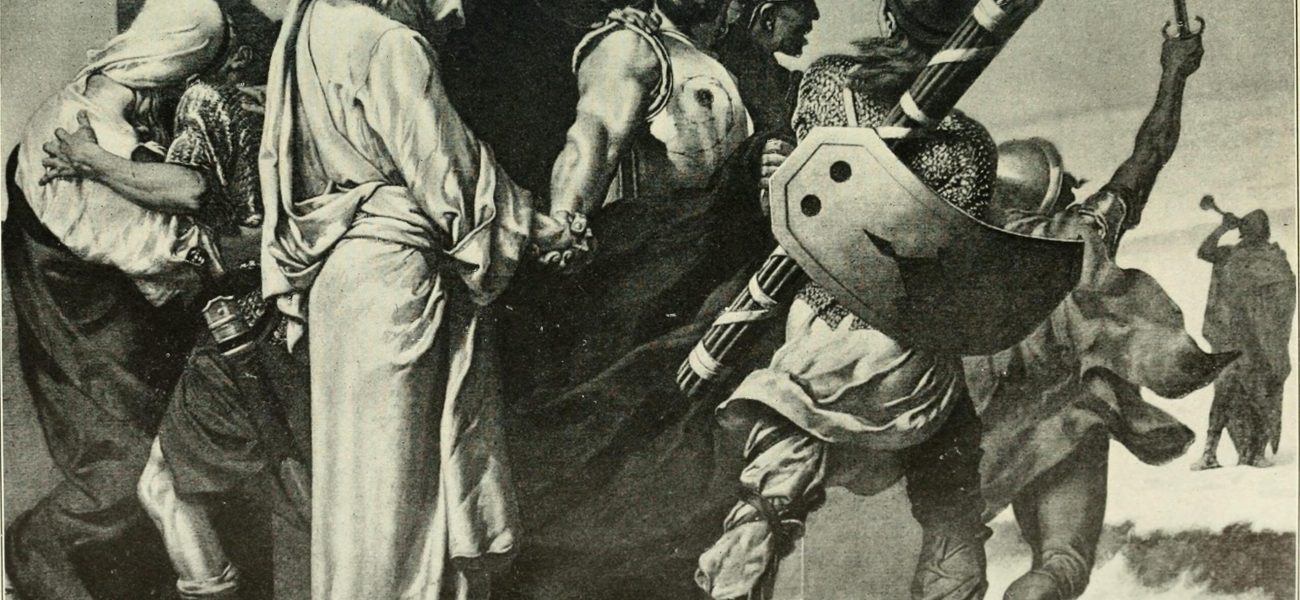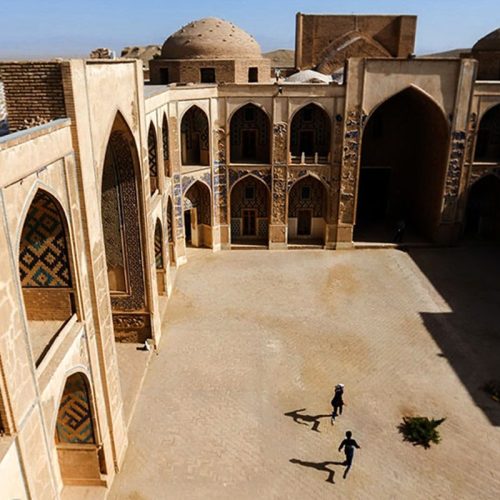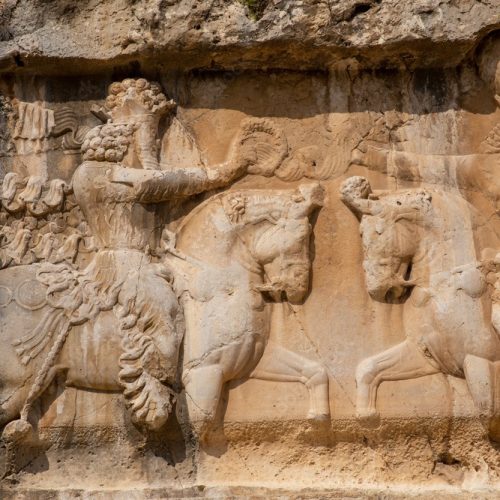Once upon a time, in the rugged and fertile landscapes of ancient Iran, a visionary leader emerged to shape the destiny of a scattered and often fractious people. This tale unfolds in the annals of history, with Deioces, a man of cunning intellect and political acumen, as the central figure in the founding and ascent of the Median Kingdom.
I. Prologue: The Fragmented Tribes
In the twilight of ancient times, the vast expanse of the Iranian plateau echoed with the diverse tongues and clashed with the myriad ambitions of nomadic tribes. The scattered communities, each fiercely guarding its traditions and territories, painted a picture of a land in perpetual flux. The air crackled with the tension of rivalries, and the echoes of conflicts whispered through the mountains and plains.
Among the myriad tribes that populated this rugged terrain, the Medes stood as a microcosm of the larger struggle for dominance. Bound by shared ancestry yet fractured by internal divisions, the Medes epitomized the chaos that enveloped the region. The tapestry of their existence was woven with threads of feuds, intertribal conflicts, and a constant struggle for resources.
In this tumultuous landscape, Deioces emerged as a figure of quiet authority, observing the turbulence with a discerning eye. The tales of his childhood, spent among the tribal elders and under the vast, starlit sky, began to circulate. A perceptive and precocious youth, Deioces absorbed the lessons of leadership from the oral traditions passed down by the tribal storytellers.
The fragmented tribes, each holding steadfastly to its customs, were both the canvas upon which Deioces would paint his vision and the mosaic of challenges that spurred him toward his destiny. The young nobleman, with an innate understanding of the tribal intricacies, recognized the pressing need for unity in the face of external threats and internal discord.
As the winds of change whispered through the hills, the stage was set for a tale of transformation—one where a young visionary would step forward to unite the discordant melodies of the Medes into a symphony of unity and purpose. The journey of Deioces from a keen observer of tribal strife to the architect of a united Median Kingdom was about to commence, echoing through the corridors of time as a testament to the power of leadership amid chaos.
II. Early Life and Rise to Power: A Visionary’s Awakening
Deioces, a scion of noble lineage, spent his formative years amidst the nomadic rhythms of the Median tribes. Raised under the expansive sky that stretched over the Iranian plateau, he imbibed the tales of ancient heroes, the tribal lore, and the whispers of the winds that carried with them the aspirations of a people yearning for stability.
From a young age, Deioces exhibited an uncanny ability to discern patterns within the intricate tapestry of tribal relationships. His keen intellect and diplomatic finesse became evident as he engaged in the age-old traditions of tribal councils and gatherings. Observing the ebb and flow of power dynamics, he recognized that the survival of the Medes lay not in perpetual conflict but in a shared destiny.
The turning point in Deioces’ life came when he found himself at the heart of a protracted tribal dispute. With eloquence and sagacity, he mediated between conflicting factions, channeling the wisdom of the tribal elders to forge a compromise that transcended individual grievances. The tribes, weary from strife, began to see in Deioces a unifying force, a leader capable of transforming discord into harmony.
Word of Deioces’ diplomatic triumphs spread like wildfire among the tribes. His reputation as a peacemaker, a man of reason in a sea of discord, became a beacon of hope for those yearning for an end to perpetual strife. The Medes, recognizing the need for a leader who could guide them through the tumultuous currents of their existence, turned their collective gaze toward Deioces.
With the support of those who had witnessed his diplomatic prowess firsthand, Deioces ascended to a position of prominence within the tribal hierarchy. The chieftains and elders, once embroiled in internecine rivalries, found themselves compelled to rally behind a leader whose vision extended beyond the immediate disputes. Deioces, at the helm of a growing coalition of tribes, became the embodiment of a shared dream—the dream of a united Median people.
As he rose to prominence, Deioces realized that mere rhetoric would not suffice to sustain the fragile alliance he had woven. He envisioned a more permanent solution to the perennial challenges faced by the Medes. The seeds of his ambition took root, and a grander design began to crystallize in his mind—one that would not only unite the tribes but also lay the foundations for a kingdom that would stand the test of time.
The early chapters of Deioces’ journey were marked by the delicate dance of diplomacy and the cultivation of alliances. Little did he know that his ascent from a mediator in tribal disputes to a unifying force within the Medes was merely the prologue to a narrative that would forever alter the course of Iranian history. The stage was set for the grand act of statecraft that awaited him—the establishment of the Median Kingdom and the realization of a visionary’s quest for order in a land teetering on the brink of chaos.
III. The Ascension: Establishing Ecbatana

As Deioces stood at the precipice of leadership, the vision that had taken root in his mind began to materialize into a grand design—an endeavor that would not only solidify his rule but also leave an indelible mark on the landscape of ancient Iran. The scattered tribes, once at odds, now looked to him not just as a leader but as the architect of their collective destiny.
The Vision Unveiled
With the tribal confederation solidified under his leadership, Deioces turned his gaze toward the construction of a capital befitting the aspirations of a united people. He envisioned a city that would stand as a testament to the newfound order he sought to establish—a city that would echo through the ages as a symbol of the unity forged from the crucible of tribal strife.
Ecbatana, the jewel of the Iranian plateau, rose from the earth under Deioces’ watchful eye. The city’s foundation was laid with meticulous precision, mirroring the delicate balance he sought to maintain in the delicate tapestry of his kingdom. The streets, arranged in a harmonious pattern, reflected not only the physical order of the city but the unity he aspired to instill in the hearts of its inhabitants.
The Grandeur of Ecbatana
Ecbatana, nestled in the foothills of the Zagros Mountains, became a reflection of Deioces’ aspirations. Its architectural splendor rivaled the grandest cities of the time. The royal palace, adorned with intricate carvings and shimmering with the wealth of the united Medes, stood as a testament to the prosperity brought forth by a visionary ruler.
The city’s seven concentric walls, painted in vibrant colors, symbolized not only a defensive fortification but also a visual representation of the layers of authority Deioces carefully constructed. Each layer, while distinct, contributed to the cohesive whole—a metaphor for the diverse yet unified people residing within the walls of Ecbatana.
The Unifying Symbol
Ecbatana was not merely a seat of governance; it became a cultural crossroads, a melting pot where the disparate traditions of the Medes mingled and evolved. The diverse communities, once defined by their tribal affiliations, now found a shared identity in the shadow of Ecbatana’s grandeur.
Deioces, in his wisdom, encouraged the celebration of Medean culture, traditions, and craftsmanship within the city. Artisans and scholars flocked to Ecbatana, their contributions weaving a rich tapestry of culture that transcended tribal boundaries. The city became a living testament to the resilience of a people who had transitioned from discord to unity.
The Legacy of Ecbatana
Ecbatana’s establishment marked not only the physical manifestation of Deioces’ vision but also a profound shift in the narrative of the Iranian plateau. The once-fragmented tribes now identified themselves as citizens of a burgeoning kingdom, and Ecbatana emerged as a beacon of stability and prosperity in a region accustomed to upheaval.
As the sun set over the Zagros Mountains, casting a warm glow upon the city’s walls, Ecbatana became a symbol of hope—a reminder that through visionary leadership, the tumultuous echoes of tribal discord could be transformed into the harmonious resonance of a United Kingdom. Deioces, the architect of Ecbatana, had not only constructed a city of grandeur but laid the cornerstone for the enduring legacy of the Median Kingdom. The tale of his ascension and the establishment of Ecbatana became etched in the annals of history, a story of transformation that would echo through the ages.
IV. The Rule of Deioces: A Reign of Order
With Ecbatana standing proudly as the heart of the burgeoning Median Kingdom, Deioces turned his attention to the delicate task of governance. His rule, characterized by a judicious blend of authority and fairness, marked a transformative era for the Medes. The city’s radiant walls reflected not only the physical security of Ecbatana but also the stability and prosperity that Deioces sought to instill in the very fabric of his kingdom.
Laws and Governance
Deioces’ reign was marked by the establishment of a legal code that sought to bring order to the once tumultuous tribal territories. Drawing on the wisdom of the tribal elders and his own innate sense of justice, Deioces crafted laws that addressed both the specific needs of individual communities and the overarching unity of the kingdom.
The royal court, an assembly of advisors and administrators chosen for their wisdom and merit rather than tribal affiliations, became the crucible where disputes were settled, and justice was meted out. Deioces’ commitment to impartiality and fairness earned him the trust of his subjects, solidifying his position as a leader whose authority was derived not solely from lineage but from a genuine concern for the welfare of his people.
Economic Prosperity
Under Deioces’ pragmatic governance, the fertile lands surrounding Ecbatana flourished. The king encouraged agricultural development, ensuring that the bounty of the land was shared equitably among the various regions of the kingdom. Trade routes, once fraught with tribal conflicts, now became conduits of prosperity as caravans traversed the kingdom, linking Ecbatana to distant lands.
The implementation of a standardized currency facilitated economic exchanges, fostering a sense of cohesion among the diverse communities. Deioces’ emphasis on economic stability ensured that the benefits of the kingdom’s prosperity reached even the farthest corners, bridging the gaps that had once defined tribal territories.
Diplomacy and Strategic Alliances
Deioces, cognizant of the geopolitical challenges that surrounded the Median Kingdom, engaged in shrewd diplomacy. He negotiated strategic alliances with neighboring powers, transforming potential adversaries into partners in trade and security. The once-isolated tribes found themselves part of a larger network, buffered by alliances that shielded the kingdom from external threats.
Ecbatana, once a city isolated by tribal conflicts, now became a diplomatic hub where envoys from distant realms sought audience with the wise ruler. Deioces’ ability to navigate the complexities of international relations bolstered the kingdom’s standing and contributed to a period of relative peace and stability.
Cultural Renaissance
Deioces’ commitment to cultural unity found expression not only in the grandeur of Ecbatana but also in the flourishing arts and intellectual pursuits within the kingdom. Scholars, poets, and artisans flocked to the city, their works reflecting the rich tapestry of a people united by a shared vision.
Ecbatana’s royal library became a repository of knowledge, housing not only the traditions of the Medes but also the accumulated wisdom of neighboring cultures. Deioces’ patronage of the arts fostered a cultural renaissance, transforming the kingdom into a beacon of enlightenment in the ancient world.
The Harmonious Court
The royal court of Ecbatana, once a diverse assembly of tribal representatives, evolved into a harmonious confluence of talents and perspectives. Deioces, with a keen eye for merit, appointed advisors and administrators based on their abilities rather than their tribal affiliations. This enlightened approach not only enhanced the efficiency of governance but also exemplified the unity that characterized his rule.
As the sun set over Ecbatana, casting a warm glow upon the city’s walls, the Median Kingdom basked in the radiance of a reign that had brought order to chaos. Deioces, the sagacious ruler, had not only united the once-fractured tribes but had laid the groundwork for a kingdom that would endure beyond his years. The story of his rule, a narrative of wise governance and cultural flourishing, became a chapter in the ongoing epic of the Median Kingdom—a realm shaped by the visionary leadership of a king whose reign exemplified the pursuit of order in a world often defined by disorder.
V. The Legacy of Deioces: Medes on the Rise
As the sun dipped below the horizon, casting its warm hues upon the majestic walls of Ecbatana, Deioces, the visionary architect of the Median Kingdom, began to witness the enduring legacy of his rule unfold. The kingdom, once a patchwork of tribal enmities and conflicting ambitions, now stood as a cohesive and thriving realm—a testament to the transformative power of wise leadership.
The Consolidation of Power
Deioces’ rule laid the groundwork for the consolidation of Median power. The city of Ecbatana, with its grandeur and strategic significance, became a symbol of the united Medes. The once-fractured tribes, bound together by a shared destiny, now identified themselves as citizens of a kingdom that extended beyond the confines of tribal affiliations.
The concentric walls of Ecbatana, which had once served as a physical defense against external threats, now represented the layers of governance and authority established by Deioces. The unity fostered within the walls of the city extended to the farthest reaches of the kingdom, creating a sense of belonging among the diverse communities that comprised the Medes.
Economic Prosperity and Trade
Under Deioces’ prudent governance, the Median Kingdom experienced a period of economic prosperity. The fertile lands surrounding Ecbatana yielded abundant harvests, and the trade routes that crisscrossed the kingdom brought wealth and cultural exchange. Caravans laden with goods traversed the kingdom, linking Ecbatana to distant lands and fostering economic interdependence.
The standardized currency introduced by Deioces facilitated smoother economic transactions, contributing to the kingdom’s financial stability. Trade agreements and alliances with neighboring powers not only secured the kingdom against external threats but also stimulated economic growth, turning Ecbatana into a vibrant hub of commerce and cultural exchange.
Military Strength and Defense
Deioces, mindful of the geopolitical realities of the ancient world, bolstered the military strength of the Median Kingdom. The once-disparate tribal militias were integrated into a formidable army, trained and equipped to defend the kingdom against potential adversaries. Ecbatana, with its strategic location, became an impregnable fortress that safeguarded the heart of the Median realm.
The defensive capabilities of the kingdom, coupled with Deioces’ diplomatic finesse, acted as a deterrent against external aggression. The Medes, once vulnerable to the whims of stronger neighbors, now commanded respect and admiration for their military prowess and strategic acumen.
Cultural Flourishing and Intellectual Renaissance
Deioces’ commitment to cultural unity and enlightenment bore fruit in the flourishing arts and intellectual pursuits within the kingdom. Ecbatana’s royal library became a beacon of knowledge, attracting scholars and thinkers from far and wide. The city’s streets resonated with the melodies of poets, and its marketplaces bustled with the exchange of ideas, creating an intellectual atmosphere that mirrored the unity fostered by Deioces.
The cultural renaissance within the kingdom not only enriched the lives of its inhabitants but also solidified the Median identity. The once-divergent traditions of the tribes now melded into a shared cultural tapestry, creating a sense of unity that transcended linguistic and tribal differences.
Enduring Diplomacy and Alliances
Deioces’ diplomatic sagacity continued to shape the destiny of the Median Kingdom long after his reign. The strategic alliances he forged endured, providing the Medes with a network of partners in trade and defense. Ecbatana, a diplomatic nexus, maintained its reputation as a city open to envoys from diverse realms, fostering peaceful relations that contributed to the stability of the kingdom.
The legacy of Deioces’ diplomatic finesse extended beyond his lifetime, influencing the geopolitical landscape of the ancient world. The Medes, once relegated to the periphery of power, now stood as a formidable player in the intricate dance of regional politics.
The Medes Ascendant
As Deioces looked out over the city he had envisioned, he witnessed the rise of the Medes as a formidable and respected kingdom. Ecbatana, with its gleaming walls and bustling streets, became not only a physical manifestation of his vision but a symbol of the enduring strength and unity of the Median people.
The tale of Deioces, the visionary ruler, became woven into the fabric of Median identity. His legacy endured in the prosperity, unity, and cultural richness of the kingdom he had founded. The Medes, once a collection of disparate tribes, had risen to prominence under the wise guidance of a leader whose vision transcended the challenges of his time. Deioces’ legacy, etched into the annals of history, stood as a testament to the transformative power of visionary leadership—a legacy that would resonate through the ages, shaping the destiny of the Median Kingdom for generations to come.
VI. Epilogue: The Unfinished Tale
As the years unfolded, and the chapters of Deioces’ reign faded into the annals of history, the kingdom he had built continued to evolve. Ecbatana, the jewel of the Iranian plateau, stood as a testament to the enduring legacy of a visionary ruler. Yet, like any epic tale, the narrative of the Median Kingdom was far from complete, and the pages of its story turned with both triumphs and challenges.
The Continuing Struggle
The Medes, once united under the wise leadership of Deioces, found that the path to unity was not without its trials. Successive rulers faced the complexities of maintaining the delicate balance of power and cultural harmony within the kingdom. Tribal loyalties, though subdued, occasionally stirred beneath the surface, reminding the rulers that the challenge of unity was an ongoing saga.
Successors and Challenges
Deioces’ successors, each inheriting a kingdom shaped by his wisdom, faced the daunting task of preserving the unity and stability he had cultivated. While some rulers proved adept at navigating the intricate tapestry of Median governance, others struggled to maintain the delicate equilibrium. The kingdom faced external pressures, and the alliances Deioces had forged were put to the test.
Internal strife, though subdued during the zenith of Deioces’ reign, occasionally reared its head. The legacy of tribal differences, deeply rooted in the history of the Medes, presented an ongoing challenge that required the wisdom and leadership reminiscent of their founding king.
The Ever-Changing Landscape
As the Median Kingdom navigated the ever-changing currents of geopolitics, it found itself entangled in the affairs of neighboring powers. The tides of conquest and rivalry, common in the ancient world, threatened the stability Deioces had worked tirelessly to establish. Ecbatana, while a formidable fortress, faced external pressures that would shape the destiny of the kingdom in unforeseen ways.
The Unfinished Tale
The tale of the Median Kingdom, though written in the golden ink of prosperity and cultural flourishing, remained an unfinished narrative. The echoes of Deioces’ vision reverberated through the corridors of Ecbatana, but the kingdom’s destiny was yet to unfold completely. The story of the Medes, like the Persian wind sweeping across the plateau, continued to carry with it the promise of both challenges and triumphs.
As the curtain fell on the reign of Deioces and subsequent rulers took the helm, the legacy of the founder endured. The kingdom he had established became a living testament to the enduring power of unity and visionary leadership. The unfinished tale of the Medes awaited the quill of successive rulers, scholars, and storytellers who would chronicle the kingdom’s journey through the ebbs and flows of history.
In the heart of Ecbatana, where the past met the present, the unfinished tale of the Median Kingdom whispered promises of resilience, transformation, and the eternal quest for order in a world defined by its perpetual state of flux. The pages turned, and the saga continued—a story destined to be written by the hands of those who dared to shape the fate of an ancient realm founded by a king named Deioces.




